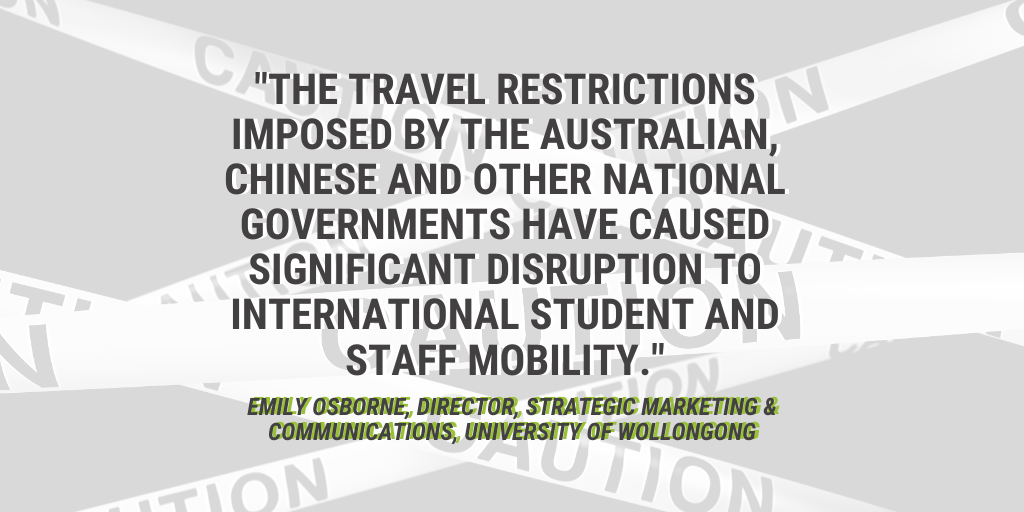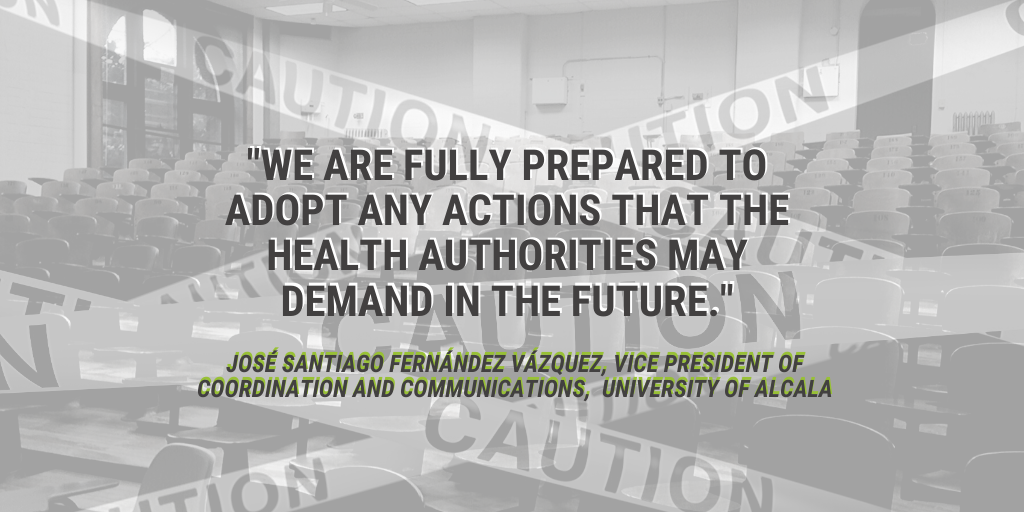Whilst scientist and researchers battle to develop a cure for the coronavirus, higher education institutions are facing one of the toughest challenges ever.
It goes without saying that the number one objective is to keep students and staff safe, but the business repercussions are now being felt keenly. The restricted mobility of university academics, the closure of schools, the inability to recruit international students, the cost of halting study abroad programmes and bringing back students. Events are being cancelled across the globe, and people are now fearing to fly or be in any group situation.
Having just been hit by months of bushfires, the biggest international recruiter by percentage of the student body, Australia, reports its universities are facing an estimated $1.2bn hit to fee revenue from some 66K international students cancelling their studies, according to the Guardian.
Other global universities have the same problem, although an academic at University of Michigan, Professor Wolfers, is reported in the THE as saying it could work out well for Australia as its reputation for taking health concerns seriously may make it a safer study destination than US universities.
In some ways, the escape of the virus from China stops us thinking of this as just an Asian problem. It is a world problem whether it is a pandemic or not. So which universities are going to come out of this well?
Deep reserves of income will help, meaning the established universities will be better protected. Those without a heavy reliance on international students might for once be pleased. So local universities may be okay. For the top global universities, international recruitment is de rigeur though. So it’s interesting to see that the reputation of Australian universities – their keenness to isolate students – will long term do them well.
The second thing that will probably safeguard universities is agile learning systems. Some universities have been investing in online delivery for years, but others have dodged the challenge. What we can definitely rely on is that once the virus is cured or dies down, it won’t be forgotten and many students will be drawn to universities with strong reputations and online delivery – whether as the main attraction or the backup.
To examine the impact of the virus on the industry, we asked some of our members to comment on the impact on their institutions. Understandably, some felt the issue was too fast-moving to be able to share its effects or their measures, which makes quite a statement in itself. However a couple of members were willing to talk about their University’s experience and reaction to this crisis:
Emily Osborne, Director, Strategic Marketing & Communications, University of Wollongong:
We have seen a challenging start to 2020 with bushfires, which impacted all of our NSW based campuses. This challenge has been followed by coronavirus; and while these circumstances are difficult for University of Wollongong, we have remained focus on the fact that it is significantly more distressing for those directly affected.
As we prepare for more students to commence with us or return to campus, much work has been done to protect the safety of all students and staff. University of Wollongong has accepted and implemented all requirements and safeguards from the Australian Government and NSW Health.

This virus outbreak has prompted widespread international media coverage and social media commentary, some of which is misinformed. Management has been conscious that this has caused anxiety for some on our campuses and in the broader community. With this in mind, University of Wollongong has offered professional support for those who need it and has encouraged respect through targeted communications to staff, students and partners.
The travel restrictions imposed by the Australian, Chinese and other national governments have caused significant disruption to international student and staff mobility. University of Wollongong has accepted that the resulting financial impact will be felt for some time. Measures are being implemented to shield our organisation from the economic impact as much as possible.
These measures are necessary to ensure we remain financially secure while continuing to deliver the quality education and positive student experience for which University of Wollongong is renowned.
The University’s Emergency Management Team meets twice weekly to coordinate a collaborative, institution-wide response and to deal with disruptions to normal operations. The Team is being supported by specially-formed working groups who are consulting across all faculties to explore and implement all possible options to assist affected students to commence or resume their studies, and to ensure the welfare of all students. Working groups are also supporting to develop communications for multiple channels to deliver the latest information to students, staff and stakeholders during this rapidly evolving situation.
José Santiago Fernández Vázquez, Vice President of Coordination and Communications, University of Alcala:
The University of Alcalá has a great number of international students, including many from China and Japan, who come to Alcalá de Henares, the birthplace of Miguel de Cervantes, to learn Spanish in our international foreign language centre “Alcalingua”.
Our biggest intervention so far has been to give support to our foreign students, who are worried about the situation in their home countries. We have also explained to our foreign students that the Spanish health system is fully prepared to deal with this global issue. We take health issues and international student support very seriously. Therefore, we are fully prepared to adopt any actions that the health authorities may demand in the future.


